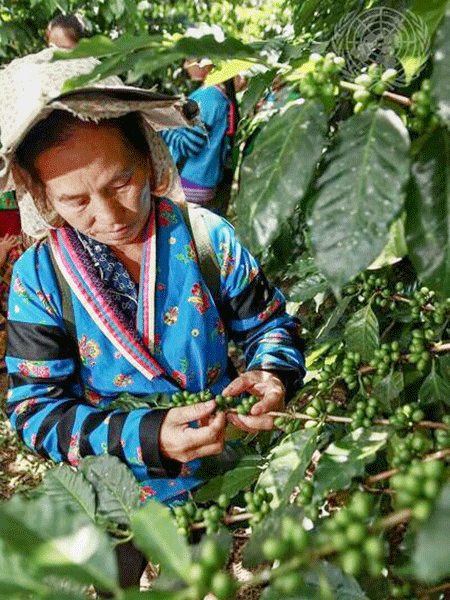 |
| The UN Office on Drugs and Crime (UNODC), in partnership with the Lao government, has worked to promote alternative livelihoods for local farmers in Huaphanh province, and other provinces particularly affected by the cultivation of poppy, from which opium is made. An UNODC programme participant inspects green coffee beans. (File photo UNODC) |
Coffee, livestock, rehab success mark opium replacement achievements in Huaphan
More than 800 families in Huaphan province have shifted from opium poppy cultivation to coffee production, contributing to exports worth over US$1.37 million and planting 800 hectares of coffee trees, which has led to the rehabilitation of 100 former opium addicts.
These encouraging figures were cited in a final report from the Lao-UN Opium Replacement Development Project, according to Lao Security News.
The decade-long project, implemented from 2016 to 2025 through the United Nations Office on Drugs and Crime (UNODC), summarised the achievements at a wrap-up meeting held in Vientiane on Thursday.
The project received financial and technical support from the United States, Luxembourg, Germany, and Japan.
Head of the Huaphan Provincial Public Security Headquaters, Brigadier General Phetsone Insouphan, and Head of Office and Coordinator for the Transnational Organised Crime UNODC Programme Office in Laos, Mr Sung Ho Hwang, were among the officials attending the meeting.
Police Major Thongchan Soungphouthone of the Narcotics Inspection and Control Department said the project was carried out in 38 villages in Xon, Xamneua, Xamtay and Kuan districts.
Its interventions focused on creating alternative livelihoods, improving food security, and providing drug treatment services as a sustainable solution to opium dependence.
In 2018, the project provided 100 breeding cows to 38 families in 19 villages. By 2023, the herd had grown to 391 animals. Sales of surplus cattle generated more than 255 million kip, while the remaining livestock strengthened families’ long-term financial assets.
At the same time, the project provided drug treatment and rehabilitation services. In 2017 and 2018, 100 opium addicts completed treatment programmes at designated centres and reintegrated into their communities, helping to reduce drug use and its social impacts.
The initiative’s most significant success has been the development of commercial coffee production.
From 2017 to 2025, the project supplied high-quality coffee seeds, organic fertiliser, nursery equipment and training.
Coffee cultivation expanded to 20 villages, directly benefiting more than 800 families. Of these, 512 families became members of the Wan Mai Coffee Cooperative, managing more than 800 hectares of coffee trees.
To improve coffee quality and market access, the project also funded the construction of roasting facilities, drying sheds and water reservoirs in 12 villages. From 2021 to 2025, 12 containers of coffee were exported to the Malongo Company in France, earning more than US$1.37 million, while domestic sales produced more than 6.5 billion kip.
Officials say farmers who switched to coffee farming have significantly increased their incomes, with some families now earning more than 100 million kip annually.
“The figures speak for themselves,” Major Thongchan said. “Sustainable crops are replacing opium and transforming livelihoods.”
By Times Reporters
(Latest Update November 11, 2025)
|


